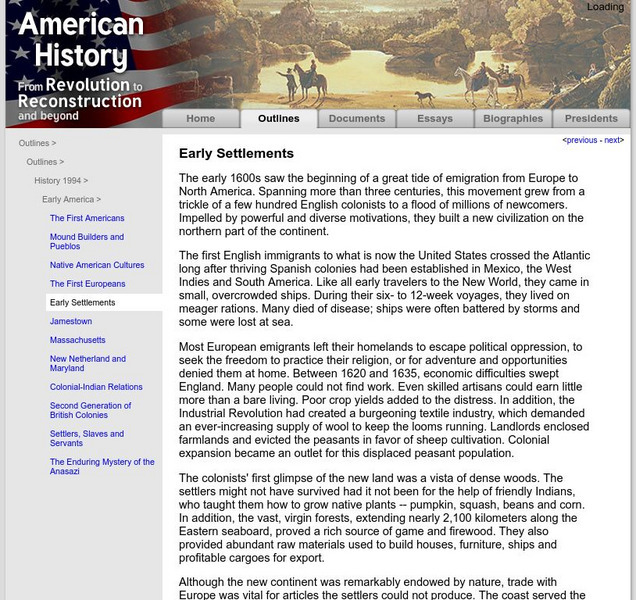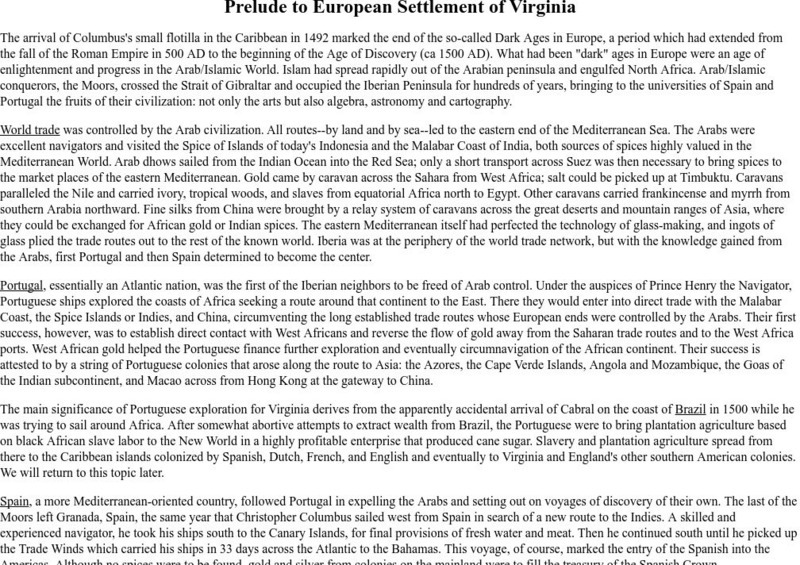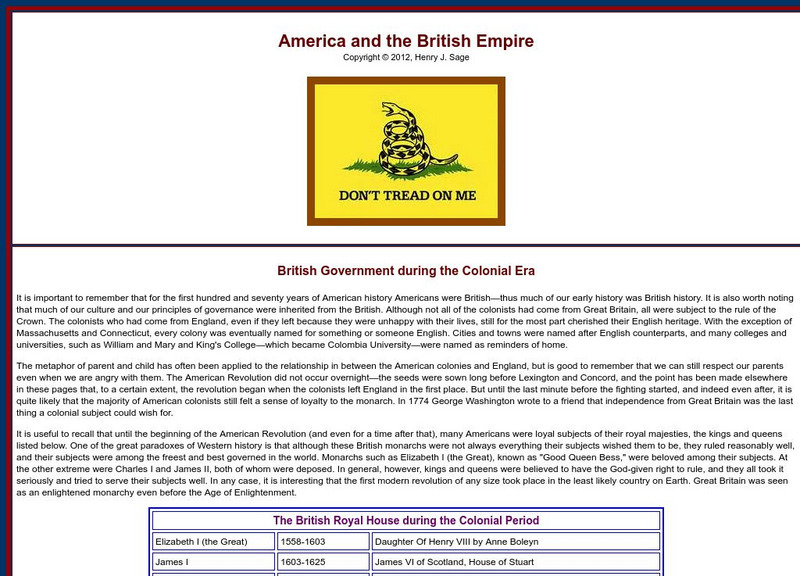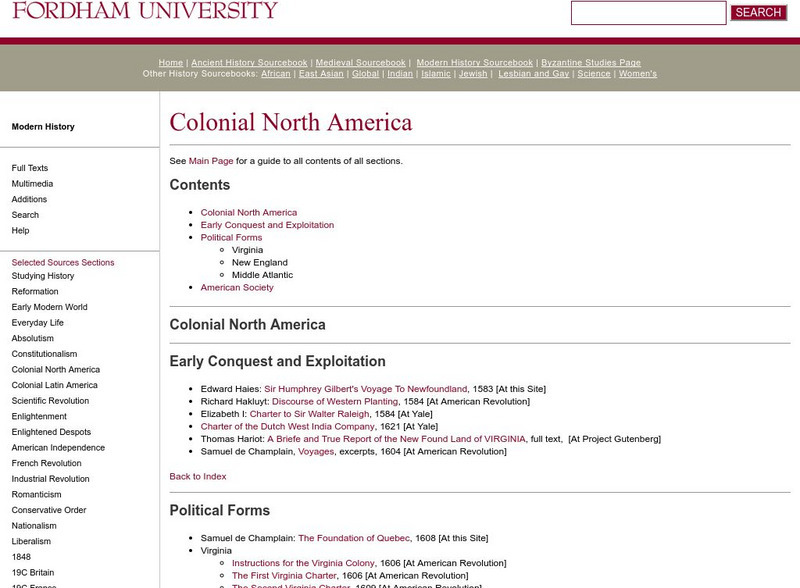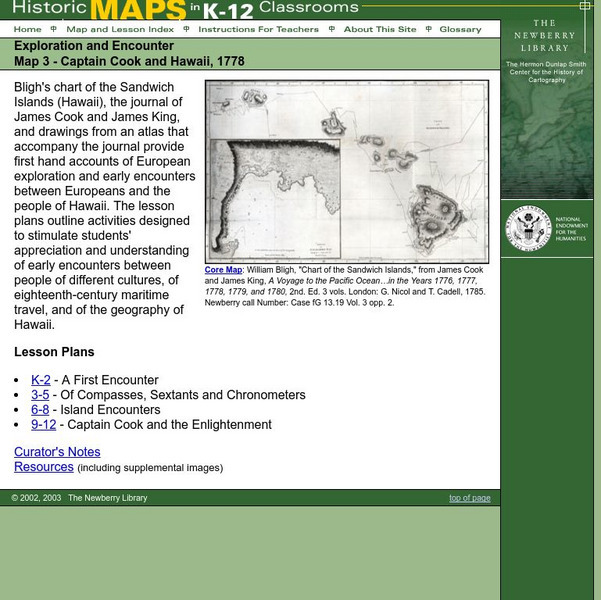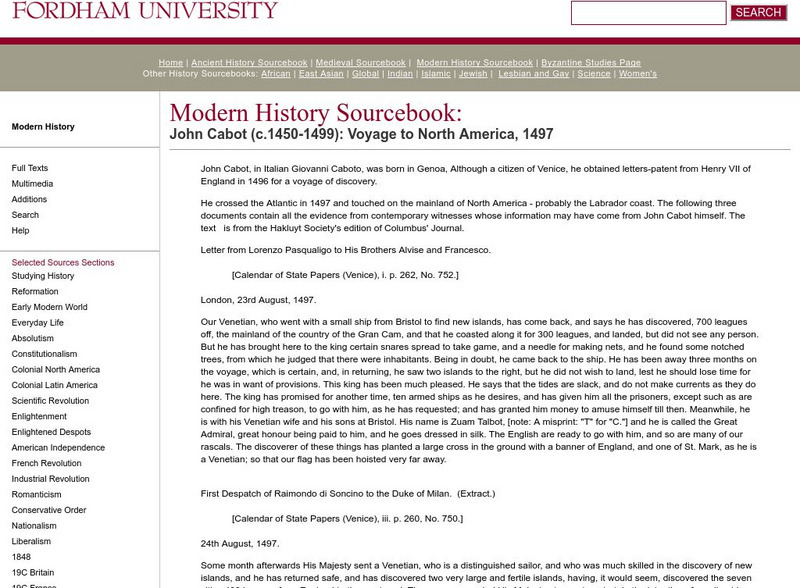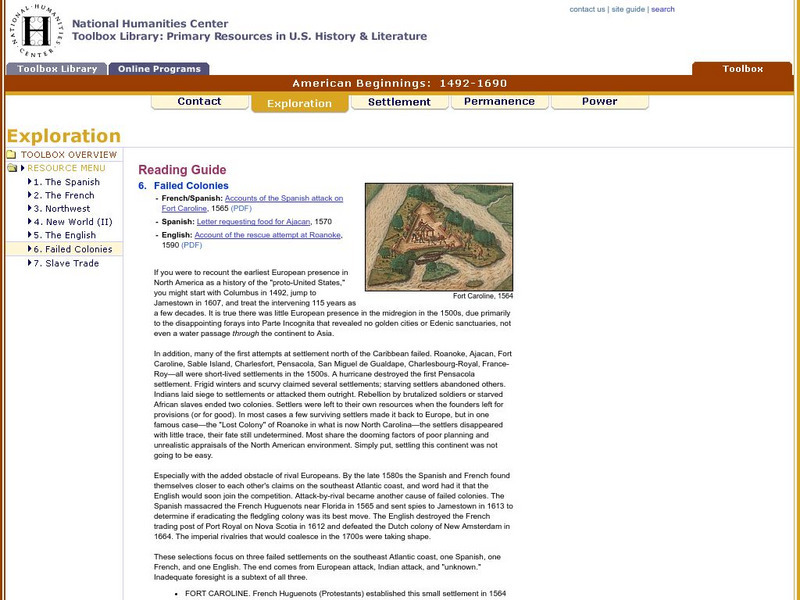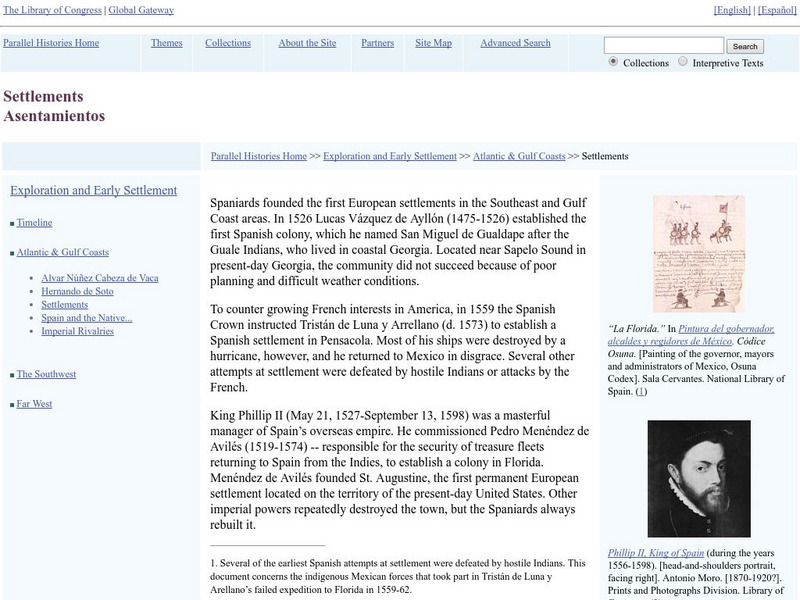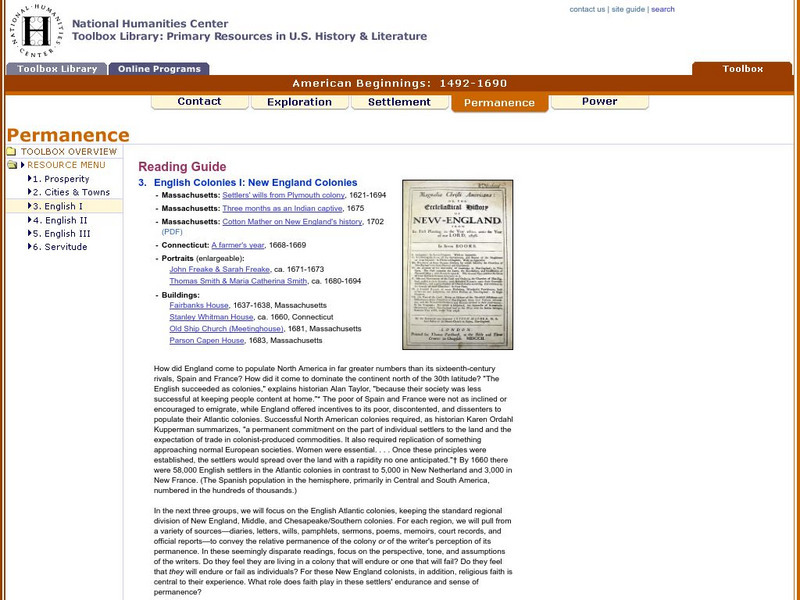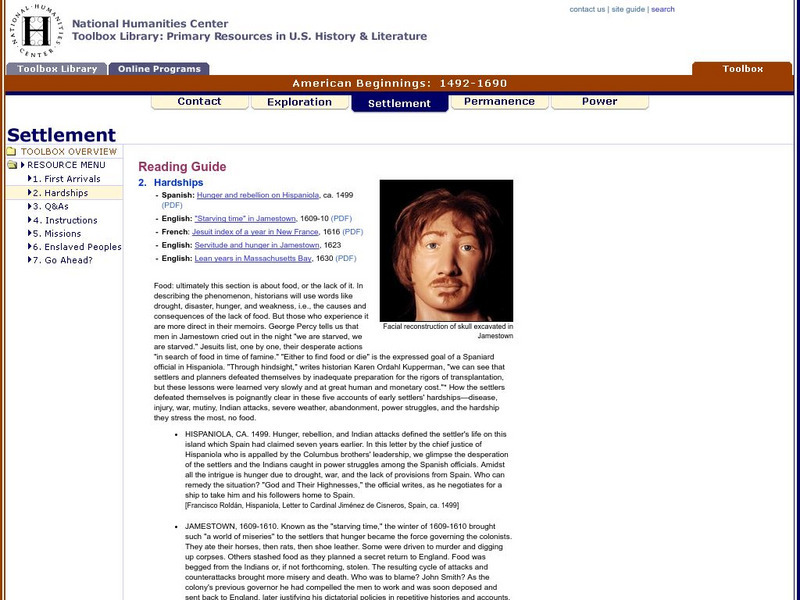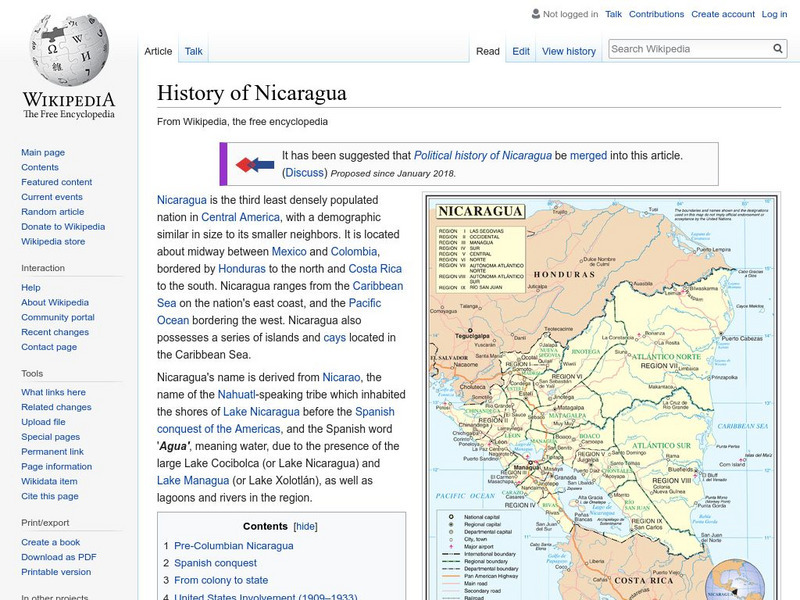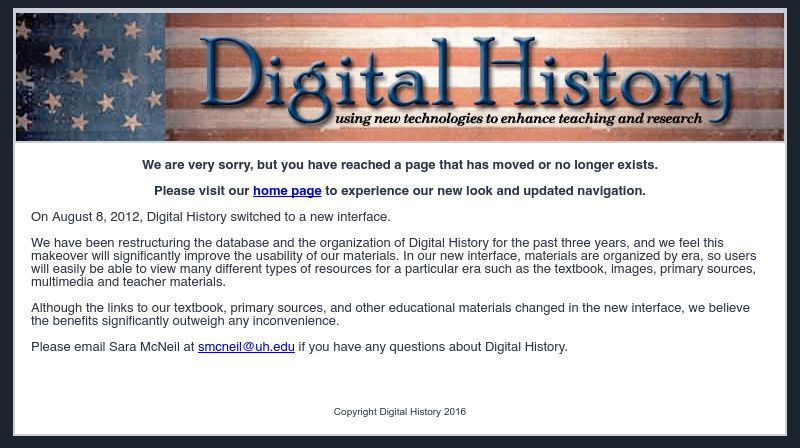University of Groningen
American History: Outlines: Early Settlements
The early 1600s saw the beginning of a great tide of emigration from Europe to North America. Spanning more than three centuries, this movement grew from a trickle of a few hundred English colonists to a flood of millions of newcomers....
Khan Academy
Khan Academy: French and Dutch Exploration in the New World
Outline text explaining how the French, Dutch, and English explorers began to make inroads into the Americans in the late 1500s and early 1600s.
Texas State Historical Association
Texas State Historical Association: Early European Exploration and Development
A chronological timeline of early European exploration and development in Texas spanning from the sixteenth to the nineteenth centuries.
Other
Radford University: Prelude to European Settlement of Virginia
This site traces the early voyages of explorers from Portugal and Spain who were trying to find new resources.
Henry J. Sage
Sage American History: America and the British Empire
Article illustrating the connection between America and the British Empire. The author points out that much of early American history is part of British history. Outlines British history since 1066.
Other
Museum of Unnatural History: Virtual Exploration Society: Colonel Percy Fawcett
Read about the exciting adventures of Col. Percy Fawcett as he mapped the jungles of South America in the early 20th century.
Internet History Sourcebooks Project
Fordham University: Modern History Sourcebook: Colonial North America
Scroll through this site from the Modern History Sourcebook of Fordham University to New England and click on the primary source documents concerning Edmund Andros. This site contains dozens of links related to colonial America. Sections...
The Newberry Library
Newberry: Exploration and Encounter: Map 3, Captain Cook and Hawaii, 1778
Map and primary source information provide first-hand account of exploration and encounters between Europeans and Hawaiians. Includes lesson plans for k-12, links to reference material and supplemental resources, and curators notes.
Library of Congress
Loc: America's Story: Duke Ellington
Explore the fascinating life of a founding father of jazz music. Duke Ellington (1899-1974 CE) was a gifted musician and composer from an early age. This website provides you with a detailed account of his life and his accomplishments.
Internet History Sourcebooks Project
Fordham University: Modern History Sourcebook: John Cabot: Voyage to North America, 1497
Letters from Cabot to different people in his life that explain his exploration and his discoveries.
Alabama Learning Exchange
Alex: Life in Colonial America
This lesson presents an explanation about who the early colonists were and why they came to America. Students will explore their lives and the economy by navigating the Internet. Students will conclude the lesson by completing a WebQuest...
National Humanities Center
National Humanities Center: Toolbox Library: Failed Colonies, American Beginnings: 1492 1690
Three European accounts of the disappointments, challenges, and outright failures to establish early successful colonial outposts in North America.
Library of Congress
Loc: Parallel Histories: Atlantic and Gulf Coasts Settlements
Insights, primary and secondary source material and timeline on early exploration and Spanish settlement of Florida and the Atlantic Coast.
National Humanities Center
National Humanities Center: Toolbox Library: English I, American Beginnings: 1492 1690
Portraits of early New Englanders as well as four buildings from seventeenth-century New England that accompany accounts in those British colonies of struggles, Indian hostilities, and economic success.
National Humanities Center
National Humanities Center: Toolbox Library: First Arrivals, American Beginnings: 1492 1690
Numerous visual images of artifacts from English settlements at Jamestown and at Plymouth, and from Spanish settlement in Hispaniola, and three original accounts of each of those early settlements that describe the possibilities and the...
National Humanities Center
National Humanities Center: Toolbox Library: Hardships, American Beginnings: 1492 1690
Three English, a French, and a Spanish primary account of the staggering losses, misery, and deprivation that characterized early European settlement as well as the resilience needed to overcome those challenges.
Wikimedia
Wikipedia: History of Nicaragua
Delve into the rich history of this Central American country. Learn much about Nicaragua's early explorations, the Somozas, and America's involvement in the country.
Digital History
Digital History: The Meaning of America
Although brief, this article points out the opposing views of the New World of America in European eyes during the exploration and early colonization period.
Varsity Tutors
Varsity Tutors: Archiving Early America: Jefferson's Views on Women
This article explores Jefferson's views on women largely through his own words.
Other
Exploring the Past: An Archeological Journey
Through an overview of past archeological expeditions, the author recounts the "Land Bridge" theory and delves into the life of the first inhabitants of North America.
University of Groningen
American History: Outlines: The First Europeans
The first Europeans to arrive in North America -- at least the first for whom there is solid evidence -- were Norse, traveling west from Greenland, where Erik the Red had founded a settlement around the year 985. In 1001 his son Leif is...
Library of Congress
Loc: Exploring the Early Americas: Competition for Empire
Part of a larger site, the primary sources here deal with the competition among the European countries in establishing a foothold in the New World.
University of Groningen
American History: Outlines: The Literature of Exploration
Had history taken a different turn, the United States easily could have been a part of the great Spanish or French overseas empires. Its present inhabitants might speak Spanish and form one nation with Mexico, or speak French and be...
McGraw Hill
Mc Graw Hill Higher Education: Old World, New Worlds
This article from McGraw-Hill Higher Education discusses European exploration in the late 1400s and 1500s and its impact on English colonization hundreds of years later.


